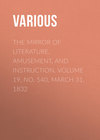Czytaj książkę: «Blackwood's Edinburgh Magazine - Volume 61, No. 376, February, 1847», strona 7
FRENCH PLAYERS AND PLAYHOUSES. 13
In these dull days of latter winter few of our readers will quarrel with us for transporting them to the gayest capital in Europe, the city of pleasure, the Capua of the age. In London, at least, there is just now little to regret; it wears its dreariest, dirtiest, and most disconsolate garb. The streets are slippery with black mud and blacker ice, a yellow halo surrounds the gas lamps, even the Bude lights look quenched and uncomfortable; cabmen, peevish at the paucity of fares, curse with triple intensity the wood pavement and the luckless garrons that slide and stumble over it; the blue and benumbed fingers of Italian grinders can scarcely turn the organ handles; tattered children and half-starved women, pale, shivering, and tearful, pester the pedestrian with offers of knitted wares, and of winter nosegays, meagre and miserable as themselves. The popular cheerfulness and merry-making of Christmas time are over, and have not yet been succeeded by the bustle and gaiety of the fashionable world. London is abandoned to its million of nobodies; the few thousands whose presence gives it life are still on the list of absentees.
Mark the contrast. But a minute ago we were in London—dull, empty London—and behold! we are in Paris—gay, crowded, lively Paris—now at the height of its season, and in full swing of carnival dissipation. By a process of which, since the days of Scheherazade, we alone possess the secret, we have flown over Kent, skimmed the Channel, sped across the uninteresting plains of Picardy, and are seated at dinner—where? In the spacious saloon of the Hotel des Princes, at the succulent table of the Café de Paris, or in the gaudy and dazzling apartments of the Maison Dorée? No matter. Or let us choose the last, the Maison Dédorée as it has been called, its external gilding having ill resisted the assaults of winter's snows and summer's parching heat. But although, as Mr. Moore of Ireland has informed us, all that's bright must fade, it follows not that the substantial deteriorates with the superficial. And the cookery of the Maison Dorée has improved as its gilding has rubbed off, until even the Café de Paris and the far-famed Trois Frères must veil their inferior charms before the manifold perfections of this Apician sanctuary. Here, then, we establish ourselves, in this snug embrasure, whence we have a full view of the throng of diners, whilst plate glass and a muslin curtain alone intervene between us and the broad asphalt of the Boulevard. A morocco book, a sheet of vellum, and a pencil, are before us. We write a dozen lines, and hand them to our companion; he reads, nods approval, and transfers the precious document to the smug and expectant waiter. The sharp eye of that Ganymede of the Gilt House had at once detected our Britannic origin, conspicuous in our sober garb and shaven chins; and doubtless he anticipated one of those uncouth bills of fare, infamous by their gastronomical solecisms, which Englishmen are apt to perpetrate, for he smiles with an air of agreeable disappointment as he glances at our judicious menu. No cause for wonder, most dapper of garçons! 'Tis not the first time, by many, that we have tabled our Napoleons on your damask napery. Schooled by indigestion, like Dido by misfortune, we have learned to order our dinner, even at Paris; and are no more to be led astray in the labyrinth of your interminable carte, than you, versed in the currency of Albion, are to be deluded by a Brummagem sovereign, or a note of the Bank of Elegance. So, presto, to work! our blessing and a double pourboire your promised reward. And, verily, he earns them well. The potage à la bisque is irreproachable; the truffles, those black diamonds of the epicure, are the pick of Perigueux; the chambertin is of the old green seal, the sparkling ai frappé to a turn, and, whilst we tranquilly degustate and deliberately imbibe, the influence of that greatest achievement of human genius, a good dinner, percolates through our system, telling upon our moral as upon our physical man. We feel ineffably benevolent: doubtless we look so; for yonder old gentleman with the white hair, red ribbon, and ditto face, dining, tête-à-tête with himself, and who is now at his eleventh dish—a tempting but inexplicable compound, which Ortila himself would be puzzled to analyse—contemplates us, in the intervals of his forkings-in, with a benign and admiring look. Our trusty friend and vis-à-vis turns his head, and we behold ourselves reflected in the opposite mirror. 'Tis as we thought: our physiognomy is philanthropical in the extreme. Quite the "mild, angelic air," that Byron talks of, when describing a gentleman in very different circumstances.
But we have no time to dwell upon our personal fascinations, or to speculate upon the cause of their increase within the last half hour; no eyes have we save for that Lucullian salmi steaming before us; and, like ourselves, all around us are absorbed in absorbing. Though every table is full, there is little noise in the crowded apartment. Men go to the Maison Dorée to eat, not to chatter. Without, too, there is a lull, after the bustle and racket of the afternoon. The day has been splendid—crisp, bright, and invigorating, and all the dandies and beauties of Paris have been abroad, driving in the Champs Elysées, galloping through the leafless avenues of the Bois de Boulogne, basking in the winter sun upon the cheerful Boulevards. The morning's amusements are over; those of the night have not yet begun. It is the moment of the interlude, the hour of dine, and Paris is busied in the most important of its diurnal acts. But, alas for the briefness of earthly joys, and the limited capacity of mortal stomachs! Sad is it that not even in this Golden Mansion can a feeble child of clay dine twice. We long for the appetite of a Dando, for the digestion of the bird of the desert, to recommence our meal, from the soup to the fondu. Vain are our aspirations. The soft languor of repletion steals over us, as we dally with our final olive, and buzz the Lafitte. Waiter! the coffee. At the word, the essence of Mocha, black as Erebus, and fragrant as a breeze, from the Spice Islands, smokes beneath our nostrils, the sparkling glasses receive the golden liqueur, and—we have dined.
Good dinners and amusing theatricals enter largely into the pleasurable anticipations of English visiters to Paris. The fame of French cooks and actors is universal; all are eager to taste their productions, and witness their performances. Let a tyrannical royal ordinance or sumptuary law close the playhouses and cut down the bills of fare from a volume to a page, and a sensible diminution will ensue in the influx of foreigners into France. However great the desire to visit Versailles, stare at the Vendôme column, and ramble round the Palais Royal, those attractions, if put into the scale, will frequently be found less weighty than a vaudeville, a dinner at Véry's, and a breakfast at the renowned Rocher. In their expectations, both gastronomical and theatrical, strangers in Paris are often disappointed. We refer, of course, to tyros; not to the regular birds of passage who consider a month or two in the French metropolis as essential a part of their annual recreations as Ascot or the moors. These, of course, are well versed in Parisian mysteries, both of the drama and the dining room. But to the novice, a guide is necessary, whether through the crowded columns of a restaurateur's complicated carte, or amidst the fair promises held out by the two dozen playbills posted each morning at eleven o'clock upon the walls and pillars of Paris. For want of it, many a Johnny Newcome finds himself, after much bewilderment and painful deliberation, masticating an unsatisfactory dinner or witnessing a stupid play. We have often wondered that, amongst the multitude of Paris guide books, not one was to be found containing minute instructions to the stranger as to the dinners he should order, and the plays and actors he should see; giving, in short, a series of bills of fare, culinary and histrionic. This deficit has at last been supplied, at least as regards things theatrical. A book has been published which should find a place in the portmanteau of every Englishman starting for the French capital. Partly a compilation from French works, and partly the result of the author's own experience, it contains the general history of each of the Paris theatres, biographical and critical sketches of the actors, lists and anecdotes of the principal musicians and authors who compose and write for the stage, and, finally, an enumeration of the best performers at each theatre, and of the pieces in which they are seen to the greatest advantage. We need say no more to demonstrate the utility of the work to those going abroad. And by those remaining at home, its lively pages will be found a mine of amusing anecdote and curious information. Abounding in racy and pungent details, sometimes valuable from their connexion with historical characters, and as illustrations of the manners and morals of the times, the history of the French stage might almost be indefinitely prolonged; and, amidst the multitude of materials, it required some ingenuity to select, as Mr. Hervey has done, those most suitable to the taste of the day, and to pack them into a single volume.
Less than a century ago Paris contained but four theatres. These were, the French Comedy, the Royal Academy of Music or Grand Opera, the Italian Comedy, where vaudevilles and comic operas were performed, and the Theatre de la Foire. The two last named were the ancestors of the present Opera Comique. "Up to 1593," says Mr. Hervey, "the actors of the Théatres de la Foire St. Germain and St. Laurent consisted of dogs, cats, monkeys, and even rats, some of the latter animals being so admirably trained as to dance a grand ballet on a table, whilst one in particular, a white rat from Lapland, executed a saraband with surpassing grace." In 1716 the manager of one of these theatres obtained leave to give musical performances. This was the origin of the Opera Comique, which, forty years later, was amalgamated with the Italian comedy at the Hôtel de Bourgogne, whence, in 1783, the united companies transferred themselves to the Salle Favart. To the four theatres above enumerated, a few others were added during the reigns of Louis XV. and his successor, but they were of little note, and the increase in the number of theatrical establishments was unimportant until the revolution. Then license was universal, and no special one was required to open theatres. In 1791 a prodigious number were established, and, for some years afterwards, nearly fifty, large and small, existed in Paris. In the time of the empire twenty-eight of these remained, until Napoleon issued an edict reducing them to ten. At the present day the French capital contains twenty-two theatres, including the new Théatre Montpensier, the privilege for which was conceded to Alexandre Dumas at the request of the prince whose name it bears. Besides these there are a number of petty playhouses outside the barriers, at Batignolles, Belleville, and similar places, and Mr. Hervey informs us that a license has just been granted for a third French opera-house. Play-loving as the population of Paris undoubtedly is, it must be admitted that ample provision is made for its gratification.
The natural classification of the more important of the Parisian theatres, about fifteen in number, is under four heads: opera—tragedy, comedy, and drama—vaudeville—melodrama. The first division includes the French opera, the Italians, the Opera Comique; the second, the Français and the Odeon; at the Porte St. Martin and Ambigu Comique, melodrama is the staple commodity, varied, however, with performances of a lighter kind; whilst vaudevilles, broad farces, and short comedies constitute the chief stock in trade of the remainder. At many of the theatres an entire change in the style of the performances is of no unfrequent occurrence. We have known the Gaité in the dolefuls, and the Porte St. Martin abandoning its scaffolds, trap-doors, and other melodramatic horrors, for fun, farce, and ballet. As a regular thing, dancing is only to be seen at the Grand Opera. The license of each theatre specifies the nature of the performances allowed it, but this is a matter difficult exactly to define, and the rule is easy of evasion. A better check, perhaps, is the jealousy with which one theatre beholds another infringing on its attributes. Thus, some years ago, at the Français, where the performances should be confined to tragedy, high comedy, and drama, a play interspersed with songs was brought out. The Vaudeville viewed this as a usurpation of its privileges, and forthwith produced a piece called "La Tragédie au Vaudeville," saying that if the Français sang vaudevilles, the Vaudeville was justified in singing tragedy.
There are in Paris four Theatres Royal, subsidised by the French government to the extent of about twelve hundred thousand francs, or nearly £50,000. Rather more than the half of this sum goes to the Grand Opera, nor is it too much, if we consider the enormous salaries paid to the singers and dancers at that theatre, and the low prices of admission; the best place in the house costing less than a pit-ticket at the Italian opera in London. The Opera Comique receives nearly ten thousand pounds a-year, the Français eight, the Odeon four. The other theatres do as well as they can without subsidies, and, as in this country, are losing or profitable concerns according to the skill of the manager, to the merits of the actors and plays produced; and, oftener still, according to the caprice and good pleasure of the public. Their prices of admission are generally higher in proportion than those of the larger theatres. It must be admitted that their performances are often more amusing.
Although one or two attempts were made at earlier periods, the permanent establishment of the opera in France cannot be traced further back than the reign of Louis XIV., when Cardinal Mazarine had the happy idea of introducing it, in hopes of amusing that most unamuseable of monarchs. The novelty found great favour, both with sovereign and courtiers. Performances took place in the king's private apartments; the Marquis of Sourdeac, a man of immense wealth and considerable mechanical skill, constructed a theatre in his Norman castle, and brought out the "Toison d'Or," with words by Corneille. At last an opera company was regularly installed in a building in the Rue Vaugirard, and here, upon one occasion, when the King was present, the Prince of Condé, and other great nobles, danced upon the stage amongst the actors. "The first opera in which female dancers were introduced was the Triumph of Love, played at St. Germains before Louis XIV. On the occasion of this brilliant fête, several ladies of the court were amongst the performers, and it was resolved that they should in future be replaced by professional danseuses, the female characters in the ballet having previously been sustained by men." Lully, the celebrated composer, was manager of the opera house, where he amassed a very large fortune. He made himself greatly dreaded by his orchestra, whom he used to belabour over the head with his fiddle. In this manner he is said to have broken scores of violins, and one unlucky clarionet-player, in particular, who was never either in time or tune, cost him a vast number of instruments. They shivered like glass upon the obdurate noddle of the faulty Orpheus, and Lully swore he had never met with so vile a musician, or so hard a head. After a time it was discovered that the offender wore a leaden lining to his periwig. Louis XIV. never ceased to take a most paternal interest in his opera company. He went so far as to regulate and write out with his own hand, the salaries allowed to the performers. Those were not days when a singer was better paid than the general of an army, or a minister of state; when each note of a tenor's voice was worth a corresponding one, and of no small figure, issued from the Bank of France. The salary of a first rate tenor or barytone, was then less than is now given to a chorister or walking gentleman. Sixty pounds were the highest yearly sum granted by Louis XIV. to the best opera singer. The first female dancer received thirty-six pounds! We are quite sure, that the waiting maid of an Elssler or a Taglioni, would turn up her nose at such a pittance. Louis XIV. was gathered to his fathers, and soon after his death matters improved a little. Still the pay was poor enough. But what of that? Those were the palmy days of the heroes and heroines of the foot lamps. For the disciples of Thespis, Paris was a paradise. True, when dead they were refused Christian burial, but they cared little about that, sinners that they were, for, whilst living, courted, flattered, and cherished, they amassed, or more often spent, princely fortunes. During the dissolute half century preceding the revolution, they were at the summit of their prosperity. High born dames, even princesses of blood royal, culled their favourites from amongst the knights of the buskin; actresses, dancers, mere figurantes, saw the wealthiest and proudest languishing at their feet, and contending for their smiles. That was the time when Vestris, the God of Dance, as he called himself, said publicly, and with the most perfect conviction, that there were only three great men in Europe, the King of Prussia, M. de Voltaire, and himself! "There are roses as well as thorns in my profession," said he to a friend who expatiated on the happiness of being a public favourite. "I assure you, sometimes I think I would rather be a mere captain of cavalry than what I am." "Old chronicles," says Albert Cler, in a spirited sketch of the French opera, "tell us of the extraordinary luxury, in carriages, liveries, furniture, and jewels, displayed by the goddesses of the opera. The Prince d'Henin passed a contract with Sophie Arnould, by a clause of which he engaged to supply her with a new equipage every month. A nymph who flourished in the time of the Directory, the celebrated Clotilde, enjoyed, thanks to the munificence of an Italian prince and of a Spanish admiral, an income of two millions, and managed, notwithstanding this royal revenue, to get into debt to the tune of some five hundred thousand francs yearly." Earlier than this, by fifty years, the Camargo and the Sallé were all the rage. The latter, Mr. Hervey tells us, paid a visit to London, and there, at one of her performances, gold and bank-notes were showered upon the stage, to the amount of £800. Her annual salary at the French opera was less than £150. The suppers of Mademoiselle Guimard, another of the fairy-footed sisterhood, whose bust, bequeathed by her to the opera, is still the principal ornament of the dancers' green-room, were renowned throughout Europe. They occurred thrice in the week; the first was attended by the most distinguished courtiers and nobles, the second by artists and by men of letters and learning, the third, which deserved the name of an orgie, by the prettiest women she could collect.
Few of the amateurs, who, armed with double-barrelled telescopes, contemplate from box or stall the agile bounds and graceful evolutions of the houris of the ballet, have any conception of the amount of labour and torture gone through, before even an approach to perfection in the Terpsichorean art is accomplished. Alberic Second, the very witty author of a very amusing book (albeit in thorough French taste) "Les Petits Mysteres de l'Opera," to whose pages Mr. Hervey confesses himself largely indebted, gives many curious details on this subject. An immense amount of courage, patience, resignation, and toil, is necessary, to become even a middling dancer. The poor children—for dancing, above all things, must be learnt young—commence with the stocks, heel to heel and knees outwards. Half an hour of this, and another species of martyrdom begins. One foot is placed upon a bar which is grasped by the contrary hand. This is called se casser, to break one's self. After this agreeable process come the thousand and one steps, essential to an opera dancer. "Such," says an imaginary danseuse from whom M. Second professes to receive his information, "are the agreeable elements of the art of dancing. And do not suppose that these rude fatigues are of short duration. They are perpetual, and on that condition only does a dancer retain her activity and suppleness. A week's idleness must be atoned for by two months' double labour. The opera-dancer realises the fable of Sisyphus and his rock. She resembles the horse, who pays with his repose, his flesh and his liberty, the rapid victories of the racecourse. I have seen Mademoiselle Taglioni, after receiving a two hours' lesson from her father, fall helpless upon the floor, and allow herself to be undressed, spunged, and again attired, without the least consciousness of what passed. The agility and wonderful bounds with which she, that same evening, delighted the public, were at this price." Besides these terrible fatigues, dancers often run serious personal risks. So, at least, says the author of the "Petits Mysteres" who, as a journalist and frequenter of the coulisses, is excellent authority. He cannot resist a joke, but it is easy to sift the facts from their admixture of burlesque exaggerations. "By dint of incurring simulated dangers, the dancer accustoms herself to real peril, as a soldier in war time becomes habituated to murder and pillage. She suspends herself from wires, sits upon pasteboard clouds, disappears through trap doors, comes in by the chimney and goes out by the window. In the first act of the Peri there is so dangerous a leap, that I consider Carlotta Grisi risks her life every time she takes it. Let M. Petipa be once awkward, or even absent, and Carlotta will break her head upon the boards. I know an Englishman who attends every performance of this ballet. He is persuaded it will be fatal to Carlotta, and would not for the world miss the catastrophe. It is the same man who, for three years, followed Carter and Van Amburgh, always hoping that a day would come when the animals would sup with their masters, and upon their masters." Considering the preparatory ordeal and frequent perils of their profession, dancers fairly earn the money and honours paid to them. Crowned heads have condescended to treat them as equals. At Stuttgart, we are told, Taglioni, towards the commencement of her career, won the affections of the Queen of Wurtemberg, who shed tears at her departure. At Munich, the King of Bavaria introduced her to his Queen, with the words, "Mademoiselle, je vous présente ma femme." "At Vienna she was once called before the curtain twenty-two times in one evening, and was drawn to her hotel, in her own carriage, by forty young men of the first Austrian families." Every one remembers the enthusiasm excited by Fanny Elssler amongst the matter-of-fact Yankees. During her last engagement at the French opera her salary was eighty thousand francs a-year. Taglioni and Elssler personify the two styles into which the present school of dancing is divided, the ballonné and the tacqueté. The former is lightness combined with grace, when the dancer seems to float upon air. The tacqueté is vivacity and rapidity; little quick steps on the points of the feet.
The principal singers now engaged at the French opera are Duprez and Gardoni, tenors; Baroilhet, the barytone; Brémond and Serda, who have succeeded, if they could not replace, the celebrated bass, Levasseur; and Madame Stoltz. Duprez is well known in England as a singer of great energy and admirable method, but whose powers have grievously suffered from over-exertion. Halevy and Meyerbeer should be indicted as the assassins of his once beautiful voice. The five tremendous acts of Robert le Diable, and the stunning accompaniments of the author of the Juive, are destructive to any tenor. In Paris, Duprez is still a favourite, especially in Guillaume Tell, considered his crack part. Gardoni, who has now been two years on the opera boards, has replaced him in some of his characters. This young singer has a very fresh and melodious voice, great taste and feeling, but lacks power, and, it is to be feared, will share the fate of most of his predecessors, and soon succumb to the thundering orchestra of the Academie Royale.14 As Mr. Hervey very justly observes, there is no medium for a tenor at the French opera. He must either scream, in order to be heard above the music, or be wholly inaudible. Baroilhet is unquestionably the best of the present opera company. His acting and singing are alike good, and his voice, of a less delicate texture than a tenor, has preserved its vigour and freshness. It would be unfair to estimate his abilities by his performance, some two years ago, at the London Opera-house. He was then in ill health, and was heard to great disadvantage. He has been fifteen years on the stage, but only the last five of them have been passed at Paris. He previously sang at various Italian theatres, chiefly at the San Carlo. Donizetti's Roberto Devereux and Belisario were composed expressly for him. Madame Rosine Stoltz, whose portrait, a very fair resemblance, is prefixed to Mr. Hervey's sketch of her operatic career, is a highly dramatic singer and an excellent actress, but her voice, of unusually extensive range, has a metallic sharpness which to our ear is not pleasant. She possesses a good stage face and figure, and her performance is most effective both in tragic and comic parts, although she is usually preferred in the former. We believe she has never sung in England, perhaps on account of the short respite allowed her by the French opera—but one month in the year. She is said to be a god-daughter of the Duchess of Berri. Various notices of her life have been published, but there is little agreement between them. It is generally understood that her early years were unprosperous, and that she endured much suffering and misfortune. If so, she learned mercy from persecution, for she is now noted for her benevolence, and for the generous assistance she affords to the needy amongst her comrades.
Notwithstanding the efforts and merits of these three or four singers, the French opera is in a declining state. A numerous company is not always synonymous with a strong one. The present manager, M. Léon Pillet, has been accused of disgusting, dismissing, or omitting to engage, some of the best singers of the day. Poultier, the Rouen cooper, a tenor of the Duprez school, is cited as an instance. He was engaged by a former management at a thousand francs a-month for eight months in the year, but, although much liked by the public, he was kept in the background, owing partly, it was reported, to his own unassuming character, and partly to certain green-room intrigues and jealousies. During his vacation he starred in the provinces, earning four or five times the amount of his Paris salary. In his native town he was carried in triumph, and treated to an interminable serenade, whose performers, according to the deposition of our friend, M. Second, relieved each other every two hours, and kept up their harmony for a whole day and night. Roger, of the Opera Comique, is another singer whose proper place is at the Grand Opera, he is young, handsome, a good actor, and since Duprez' decline, the best French tenor extant.
At Paris theatres, and especially at the opera, the next best thing to having a good company is to have a good claque. Such, at least, is the theory of the actors and managers of the present day. The more rusty the tenor, the more wrinkled the prima donna, the greater the need of an army of iron-fisted, brazen-visaged hirelings to get artificial applause, and inoculate the public with their factitious enthusiasm. In this latter respect they now rarely succeed. The device is stale, the trick detected, and yet the practice is maintained. It takes in no one. Even raw provincials and newly imported foreigners are up to the stratagem before they have been a week in Paris. The press inveighs against it; audiences, far from being duped, often remain silent when most pleased, lest they should be confounded with the claqueurs. But no manager dares to strike the first blow at this troublesome abuse. There is a regular contractor for the opera claque, receiving so much a month from each actor. Duprez has always refused to submit to this extortion, but he is, or was, the only exception to the rule. The contractor has an organised regiment under his orders, mustering sixty strong. Every opera night, before the opening of the doors, they assemble at a low coffee-house in the Rue Favart, to receive his orders for the evening, and thence follow him to the theatre, into which they are admitted through a private entrance. Some of them are paid for applauding—these are the chiefs, the veteran clappers; others applaud for a free admission, whilst a third class are content to do their best for the good of the house, and to pay half-price for their tickets. The distribution of these bravo-battalions, these knights of the chandelier, as they are called, from the post of their main body being in the centre of the pit, requires much skill and judgment. The captain of the claque is an important personage, respected by his subordinates, courted by the actors, and skilled in the strategy of his profession, which yields him a handsome income. A tap of his cane on the ground is the signal for applause. The chatouilleur, or tickler, a variety of the genus claqueur, is in vogue chiefly at the smaller theatres. His duty is to laugh, and, if possible, infect his neighbours with his mirth. He stands upon a lower grade of the social step-ladder than the claqueur; very unjustly, as it appears to us, his scope for the display of original genius being decidedly larger. How delicately may he modulate his merriment, and control his cachinnations, establishing a regular gamut, rising from the titter to the guffaw, abating from the irrepressible horse-laugh to the gratified snigger. He may himself be a better actor than those for whose benefit his mirth is feigned. And when, with aching ribs and a moist pocket-handkerchief—for an accomplished chatouilleur must be able to laugh till he cries—he retires from the scene enlivened by his efforts, it is with the proud consciousness that his contagious chuckle, as much as author's jokes or buffo's comicalities, has contributed to set the theatre in a roar.
"The Theatres of Paris. By Charles Hervey." London and Paris, 1846.
[Закрыть]
Doubtless Gardoni was apprehensive of some such deterioration of his voice, for he has just left the Académie, after much opposition on the part of the manager, and has made a highly successful appearance at the Italian opera.
[Закрыть]




















